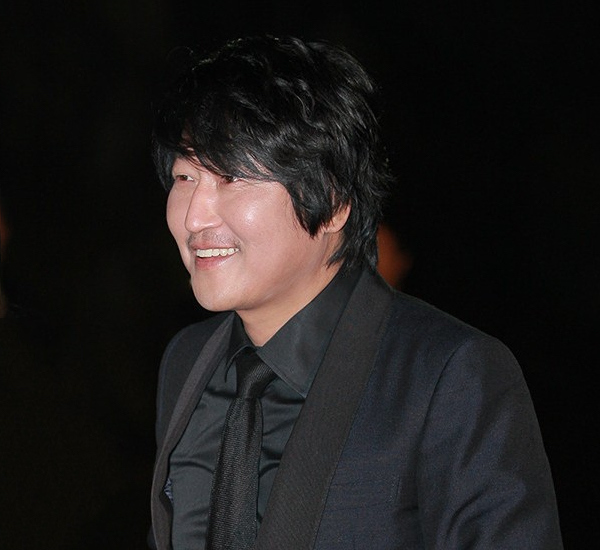The New Hollywood: South Korean Cinema Is Refreshingly Original and Genre-Bending
South Korea produces the highest quality and most rewarding viewing experiences for any movie fan

WASABCON VIA WIKIMEDIA COMMONS
Song Kang-ho has performed in breakout films such as “Parasite” and “Snowpiercer.”
June 19, 2021
The most rewarding experience when watching a film is to be blown away by the story and to feel attached to the characters. South Korea is an expert at accomplishing this. They arguably produce the highest quality films in the world. What makes their films so unique is their originality, complexity and ability to span a multitude of genres.
With “Parasite’s” Oscar win for Best Picture at the 2020 Oscars, South Korean films have reached major streaming platforms and have finally started to gain the massive popularity they deserve in the United States. South Korean films are some of the most aesthetically pleasing, emotionally captivating and well-written films because you never know what you’re going to get and that’s what makes them so great. They are unpredictable, genre-bending and masterfully crafted.
The film industry in the U.S. has taken a noticeable hit in quality in recent years due to a lack of originality, predictable storylines and an emphasis on using CGI instead of naturalistic and relatable stories. The movies that dominate the box office are usually part of a movie franchise or are based on previous material. Hopefully this trend changes soon because the plot, emotion and performances in popular U.S. movies are hitting an all-time low. To escape this downturn, U.S. cinema can look at South Korea to see how to consistently create high-quality films that resonate with all audiences.
Some might use subtitles as an excuse for why they choose not to watch international films. This is the biggest mistake anyone who enjoys watching movies can make. As Bong Joon-ho, the Oscar Award-winning director of “Parasite” stated, “Once you overcome the one-inch-tall barrier of subtitles, you will be introduced to so many more amazing films.”
If you are a horror fan, South Korea produces some of the scariest horror films of all time.
If you are a horror fan, South Korea produces some of the scariest horror films of all time. They usually involve several plot-twists, plenty of gore and elements most U.S. horror films lack, including unpredictable jump scares, complex stories and emotional depth. “Train to Busan” follows a zombie outbreak in South Korea as people seek refuge on the trains to escape to safer areas. The power, ferocity and deadliness of the zombies in “Train to Busan” are utterly terrifying, comparable with the zombies in “28 Days Later” and “Dawn of the Dead.” The visually shocking zombie herds and fight scenes are unbeatable. If you want a comparison, just think of “World War Z” on steroids.
If zombies aren’t your thing but you like a good supernatural and crime/thriller element, “The Wailing” is for you. “The Wailing” is about a mysterious illness that plagues a village. It involves demonic possessions, murder and a game of cat and mouse. The film provides a powerful look at the importance of faith, family and sanity.
If you’re more of a classic horror fan who appreciates a good monster movie, you should watch “The Host.” “The Host” is about a river monster and a father’s search with his family to find his missing daughter. It’s hard to categorize this film, as it has action scenes, comedic moments and, of course, horror. What you will quickly realize, however, is that the film is one hell of a ride. Lastly, if you think the U.S. makes good serial killer movies, wait until you’ve seen “I Saw the Devil,” probably the most realistic and gory horror film you will ever see. It follows a secret agent who is hunting down a serial killer. This film is not for the faint of heart. Nothing can prepare you for the violence as the murders and torture scenes are shown in great duration and detail. Other great South Korean horror films which can be found on Netflix are “#Alive,” “The Call” and “Forgotten.”
I would be remiss if I did not mention the two most well known and influential South Korean directors of all time, Bong Joon-Ho and Park Chan-wook.
Bong Joon-Ho deserves the title as a master of suspense, a worthy successor to legendary director Alfred Hitchcock. He has also mastered the ability to blend genres, specifically comedy with crime and thriller, like his idol Martin Scorsese. He has quickly risen to the top of current filmmakers with his Oscar Award for Best Director for “Parasite.” Bong’s fame and critical acclaim are far past due. What makes him such an influential director is his ability to craft original and captivating stories. In “Memories of Murder,” a group of detectives try to identify and stop a serial killer after a series of rapes and murders takes over a town. “Okja” is a story about animal rights as a girl attempts to save her best friend, a gigantic pig-like animal, from being killed. Other great films by Bong Joon-Ho include “The Host,” as mentioned above, “Mother” and “Snowpiercer.”
Just like Scorsese, Bong has formed one of the best dynamic duos of directors and actors with legendary South Korean actor Song Kang-ho. Song has the charisma of Leonardo Dicaprio and the seriousness of Robert DeNiro. He has worked with Bong in “Parasite,” “Memories of Murder,” “The Host” and “Snowpiercer.” Song has perfected the ability to blend comedy with intensity in his roles and is regarded by many to be the greatest current South Korean actor.
Park Chan-wook is a master at stylized and unexpected violence, writing complex screenplays, and creating quirky and unique characters. Anyone who likes the style of Quentin Tarantino will love his films. The “Handmaiden” is a beautifully shot, suspenseful romance film. It follows a South Korean woman who is hired as a handmaiden for a rich Japanese woman. What ensues is a thriller that has not one but two of the greatest plot twists in recent memory. Other great films by Park include but are not limited to “Sympathy for Mr. Vengeance” and “Oldboy.”
Give South Korean cinema a chance. It will open you up to so many original and high quality stories that the U.S. can only dream of making.















Tendai • Oct 26, 2022 at 10:35 am
With Korean movies, you never know what to expected.
DarrenGardner • Dec 27, 2021 at 4:51 am
It’s because they’re not Woke
LI0N HEART • Nov 14, 2021 at 1:40 pm
It’s about time Korea got noticed for it’s quality of films. Hollywood have ran out of ideas and just do either remakes/ reboots (which are never good) or milk the superhero stuff and very little else. There’s nothing original anymore and they just makes films that check boxes and rake in the cash and far to much Reliant on special effects. Korean movie are story driven and emotional/ uplifting. Been a long time fan of Asian cinema.
Michael Mathews • Nov 29, 2021 at 8:38 pm
Glad to hear someone else thinks the same as me! There is so much more originality and intelligence in Korean films that the majority of American films can’t come close to matching.
Sakura Kasugano • Jun 20, 2021 at 12:32 am
American movies are old fashion and overrated. Talking about anything animation Japan is the King, but in real life productions Korea is the other King.
Michael Mathews • Nov 29, 2021 at 8:36 pm
Definitely agree, and great point about Japan and animation! Nothing is better than watching some Studio Ghibli movies!